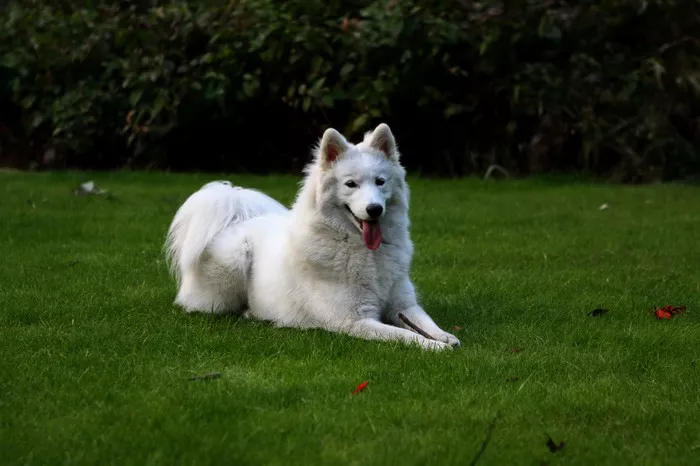Caring for a Samoyed comes with the responsibility of providing proper nutrition to ensure their well-being. The question of how much to feed a Samoyed is a common concern among pet owners. In this comprehensive guide, we will explore Samoyed feeding amounts for puppies and adult dogs, shedding light on the factors that influence their dietary needs. Understanding what to look for in Samoyed’s food is crucial for maintaining their health and vitality throughout their life.
Samoyed Feeding Amounts for Puppies:
Feeding a Samoyed puppy requires careful consideration of their growth and development needs. Puppies are in a phase of rapid growth, necessitating a diet that supports their bone development, muscle growth, and overall health. The American Kennel Club (AKC) recommends feeding Samoyed puppies multiple small meals throughout the day to accommodate their higher energy levels and metabolism.
A general guideline for Samoyed puppies is to provide about 1.5 to 2 cups of high-quality puppy food per day, divided into three to four meals. The exact amount may vary based on factors such as the puppy’s age, weight, activity level, and the specific brand of dog food. Monitoring the puppy’s weight and adjusting the portions accordingly is essential to prevent overfeeding or underfeeding.
Samoyed Feeding Amounts for Adult Dogs:
As Samoyeds transition from puppyhood to adulthood, their dietary requirements evolve. Adult Samoyeds are generally less active than their younger counterparts, and their feeding amounts need to be adjusted accordingly to maintain a healthy weight and prevent obesity.
The AKC suggests feeding adult Samoyeds about 2 to 2.5 cups of high-quality dog food per day, divided into two meals. Again, individual variations in weight, activity level, and metabolism should be taken into account when determining the appropriate portion size. Regular monitoring of the dog’s body condition and adjustments to the feeding amounts may be necessary to ensure optimal health.
What to Look for in Samoyed’s Food:
Selecting the right dog food is a crucial aspect of ensuring your Samoyed receives the necessary nutrients for a long and healthy life. Knowing what to look for in Samoyed’s food involves considering various factors to make informed choices.
Protein Content: Samoyeds, being a medium to large breed, benefit from a diet with a moderate to high protein content. Look for dog foods with real meat as the primary ingredient, such as chicken, beef, or fish. Adequate protein supports muscle maintenance and overall vitality.
Healthy Fats: Healthy fats, including omega-3 and omega-6 fatty acids, contribute to a Samoyed’s coat health and skin condition. Foods containing sources like fish oil or flaxseed can help maintain their distinctive double coat and prevent dry skin issues.
Whole Grains and Carbohydrates: While Samoyeds are not known for food sensitivities, opting for dog foods with whole grains and carbohydrates provides a balanced source of energy. Brown rice, sweet potatoes, and barley are good choices to support their active lifestyle.
Avoid Fillers and Artificial Additives: Read the ingredient list carefully and avoid dog foods with excessive fillers, artificial preservatives, or colors. High-quality dog foods prioritize real, wholesome ingredients, contributing to better digestion and overall health.
Joint Health Supplements: Samoyeds are prone to certain joint issues, and incorporating foods with joint health supplements such as glucosamine and chondroitin sulfate can be beneficial. These supplements support joint mobility and help prevent conditions like hip dysplasia.
Caloric Density: Adjust the caloric density of the food based on the dog’s life stage and activity level. Avoid overfeeding by following the recommended feeding amounts on the packaging and consulting with your veterinarian if unsure about the appropriate portion size.
Tailored to Life Stage: Choose dog food specifically formulated for your Samoyed’s life stage—puppy, adult, or senior. These formulations address the changing nutritional needs of Samoyeds at different stages of life, ensuring they receive the right balance of nutrients.
Balancing Act: Managing Samoyed Feeding for Optimal Health:
Achieving the right balance in Samoyed feeding amounts involves a combination of proper nutrition, regular monitoring, and adjustments based on individual needs. Maintaining an ideal body condition is key to preventing health issues related to overfeeding or underfeeding.
Regular Veterinary Check-ups: Schedule regular veterinary check-ups to assess your Samoyed’s overall health and weight. Your veterinarian can provide personalized recommendations based on the dog’s specific requirements, helping you fine-tune the feeding plan.
Monitor Body Condition: Keep an eye on your Samoyed’s body condition by observing their weight, waistline, and overall appearance. Adjust the feeding amounts as needed to ensure they stay within a healthy weight range.
Activity Level Consideration: Tailor the feeding amounts to your Samoyed’s activity level. A more active dog may require slightly more calories, while a less active one may need fewer to prevent weight gain.
Be Mindful of Treats: Treats play a role in your Samoyed’s overall daily caloric intake. While treats can be used for training and bonding, be mindful of the quantity to avoid unintentional overfeeding. Opt for healthy, low-calorie treats when possible.
Hydration Matters: Ensure your Samoyed has access to fresh, clean water at all times. Adequate hydration is essential for digestion and overall health. Monitor water intake, especially during warmer months or increased physical activity.
Addressing Special Dietary Needs: If your Samoyed has specific health conditions or dietary restrictions, consult with your veterinarian to choose a specialized diet that addresses their unique needs. Some dogs may require prescription diets to manage certain health issues effectively.
Conclusion:
Understanding the nuances of Samoyed feeding amounts is a fundamental aspect of responsible pet ownership. By catering to the specific nutritional needs of Samoyed puppies and adult dogs and being mindful of what to look for in their food, you contribute to their overall health, longevity, and happiness. A well-balanced diet, coupled with regular monitoring and veterinary guidance, ensures that your Samoyed thrives at every stage of their life. Remember, a well-fed Samoyed is a happy and healthy companion.


